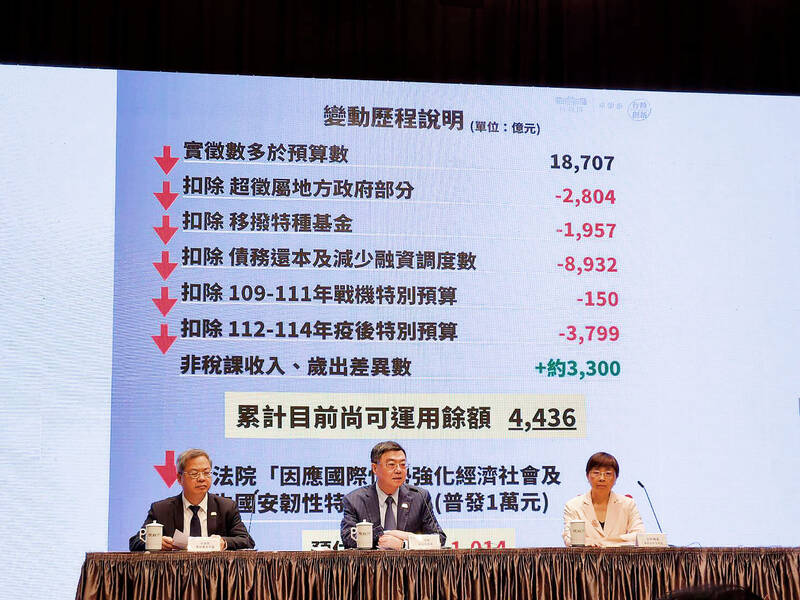The government would have to issue NT$101.4 billion (US$3.45 billion) in debt to implement the Chinese Nationalist Party’s (KMT) proposed universal NT$10,000 cash handouts, Premier Cho Jung-tai (卓榮泰) said yesterday, calling the scheme morally and financially questionable given the state of the nation’s finances.
The Legislative Yuan on Friday last week passed the third reading of a special relief package that included the cash handout, increasing the Executive Yuan’s proposed budget of NT$410 billion to NT$545 billion.
The opposition has claimed that the government has accumulated a budget surplus of NT$1.8 trillion from 2021 to last year, but the majority of it has already been allocated, leaving just NT$443.6 billion, Cho said.

Photo: Hsieh Chun-lin, Taipei Times
Along with NT$330 billion from nontax revenue and expenditure differences, nearly NT$900 billion has been allocated to paying down debt, NT$379.9 billion for the post-COVID-19 pandemic recovery plan, NT$280.4 billion for local governments, NT$195.7 billion for special funds and NT$15 billion for the new fighter jet special budget, he said.
Opposition parties voted down a proposed NT$100 billion subsidy for Taiwan Power Co (Taipower, 台電), while adding in NT$235 billion for the universal cash handout, he said, adding that the passage of the bill was neither legal nor constitutional.
Under the current circumstances, finances should be focused on disaster prevention, bolstering the economy, boosting national resilience and supporting vulnerable segments of the population, he said.
Cho said that he would again present a detailed report to the legislature to allow the public to understand the situation.
The government would use budgets, among other means, to support state enterprises including Taipower, whether the NT$100 billion subsidy is approved or not, he said.
The Cabinet has already proposed supplementary budgets, general budgets and three separate acts to support Taipower, which were cut or rejected by the opposition, he added.
Taipower needs to stabilize its finances, strengthen its financial situation, improve infrastructure and boost the resilience of the grid, he said.
The opposition has said that the special act is a legislative bill and not a budget bill, and is therefore in line with the Constitution, adding that the Executive Yuan had contravened the Constitution by refusing to draft a budget in accordance with the act.
Cho said that the opposition should not pretend to be ignorant of the law to evade legal provisions.
The Constitution clearly states that the Executive Yuan is responsible for drafting budgets and the legislature is tasked with reviewing them, he said.
Nevertheless, the Legislative Yuan had increased administrative spending without consulting the Cabinet, he added.
Cho urged legislators to practice fiscal discipline and follow proper procedures in passing budgetary bills.
The Executive Yuan has in the past sought remedies for multiple legislative and budget-related acts that it deemed unconstitutional or unlawful, he said, adding that the Cabinet would consider those actions in planning its next steps.

Authorities have detained three former Taiwan Semiconductor Manufacturing Co (TMSC, 台積電) employees on suspicion of compromising classified technology used in making 2-nanometer chips, the Taiwan High Prosecutors’ Office said yesterday. Prosecutors are holding a former TSMC engineer surnamed Chen (陳) and two recently sacked TSMC engineers, including one person surnamed Wu (吳) in detention with restricted communication, following an investigation launched on July 25, a statement said. The announcement came a day after Nikkei Asia reported on the technology theft in an exclusive story, saying TSMC had fired two workers for contravening data rules on advanced chipmaking technology. Two-nanometer wafers are the most

DEFENSE: The first set of three NASAMS that were previously purchased is expected to be delivered by the end of this year and deployed near the capital, sources said Taiwan plans to procure 28 more sets of M-142 High Mobility Artillery Rocket Systems (HIMARS), as well as nine additional sets of National Advanced Surface-to-Air Missile Systems (NASAMS), military sources said yesterday. Taiwan had previously purchased 29 HIMARS launchers from the US and received the first 11 last year. Once the planned purchases are completed and delivered, Taiwan would have 57 sets of HIMARS. The army has also increased the number of MGM-140 Army Tactical Missile Systems (ATACMS) purchased from 64 to 84, the sources added. Each HIMARS launch pod can carry six Guided Multiple Launch Rocket Systems, capable of

CHINA’s BULLYING: The former British prime minister said that he believes ‘Taiwan can and will’ protect its freedom and democracy, as its people are lovers of liberty Former British prime minister Boris Johnson yesterday said Western nations should have the courage to stand with and deepen their economic partnerships with Taiwan in the face of China’s intensified pressure. He made the remarks at the ninth Ketagalan Forum: 2025 Indo-Pacific Security Dialogue hosted by the Ministry of Foreign Affairs and the Prospect Foundation in Taipei. Johnson, who is visiting Taiwan for the first time, said he had seen Taiwan’s coastline on a screen on his indoor bicycle, but wanted to learn more about the nation, including its artificial intelligence (AI) development, the key technology of the 21st century. Calling himself an

South Korea yesterday said that it was removing loudspeakers used to blare K-pop and news reports to North Korea, as the new administration in Seoul tries to ease tensions with its bellicose neighbor. The nations, still technically at war, had already halted propaganda broadcasts along the demilitarized zone, Seoul’s military said in June after the election of South Korean President Lee Jae-myung. It said in June that Pyongyang stopped transmitting bizarre, unsettling noises along the border that had become a major nuisance for South Korean residents, a day after South Korea’s loudspeakers fell silent. “Starting today, the military has begun removing the loudspeakers,”